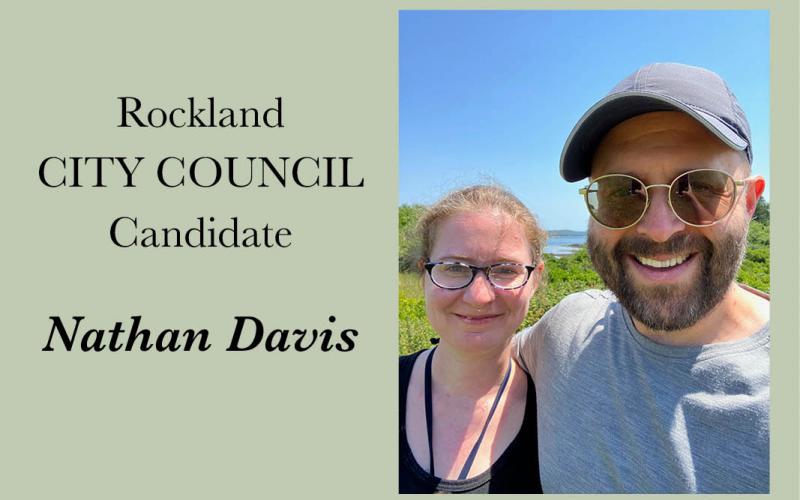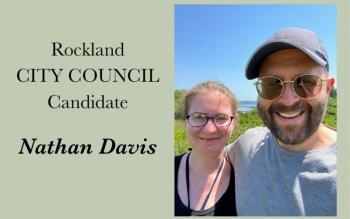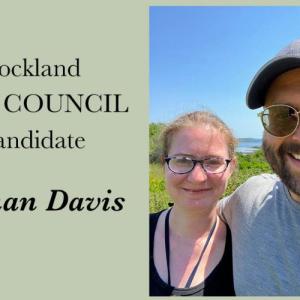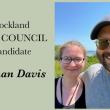On the issues: Rockland City Council Candidate Nathan Davis
Four candidates are competing for two open seats on the Rockland City Council, with elections set for Nov. 8. Both seats represent three-year terms. Those running for office are Nathan Davis, Adam Lachman, Steven MacDonald and Penelope York. Penobscot Bay Pilot has posed questions to each candidate, providing the opportunity for the public to better understand their positions on issues. Here, candidate Nathan Davis responds:
Please provide a concise biography of yourself.
I grew up in New Hampshire and studied mathematics and music in college and graduate school. Math led to computer programming, which is what pays the bills. I co-founded Steel House, a collaborative workspace in Rockland, in 2014. I'm finishing my first term on the Rockland City Council.
What are Rockland's greatest strengths, and how do you hope to support them?
One thing that I love about Rockland is the degree to which people of different backgrounds and economic circumstances rub shoulders here. This is one of our greatest strengths. Of course, we're in the process of losing this strength, since so many people are being priced out. I want to make sure that people of all backgrounds can create fulfilling lives here - which (among other things) requires building and preserving affordable housing.
Another remarkable strength is, of course, our productive and beautiful harbor. I think that in general, Rockland has done a good job balancing industrial and recreational uses and environmental concerns regarding the harbor, and I will try to continue this stewardship.
What are Rockland's greatest issues to address?
Our most pressing challenge — by a wide margin — is our shortage of affordable housing. This has been brewing for decades, and the pandemic has accelerated it.
Housing was one of my primary concerns during my first term, and I spent a great deal of time and effort working to increase the supply of affordable housing. For example, I introduced legislation to allow residents and developers to build more apartments, to reduce the parking requirements for new housing, to allow the municipal government to impose affordability restrictions on the properties it sells, and to remove archaic and exclusionary restrictions on minimum home size.
There is so much left to do, though: continue to reduce barriers to development, incentivize new construction (both large and small), and establish a relationship with the Midcoast Regional Housing Trust, for example. I’d also like to explore rent stabilization, though I’m sure it would be controversial; I've heard many stories of tenants being suddenly priced out, and each one is heartbreaking.
Other significant challenges include our high tax burden, stormwater management and associated costs, and harbor infrastructure improvements and associated costs. There’s no lack of other challenges, but since so many come down to money, those jump to the top of my list.
Is the Rockland Police Department on the right course, and does it integrate well into the community?
Yes, it is on the right course, and it integrates with the community in an increasingly effective way. I'm very pleased with Chief Carroll's leadership and the direction he is taking the Department.
Is internet access to citizens adequate and affordable? If not, how would you make it so? (According to the census, 85.9 percent of households have a computer.)
For most people in Rockland, yes, and I think it's generally getting better. Over the last few years, we've seen increased competition and service options, and I think that the "dead zones" of poor internet service in Rockland are thankfully mostly in the past. I'm sure that I'll get some correspondence from people who disagree!
What is your vision for Rockland Harbor given the increased demand for real estate, and Maine’s longtime goal to protect the working waterfront?
In general, I think that the Harbor Management Plan adopted in 2020 presents an appropriate vision that balances competing concerns: industrial and recreational uses, public access, environmental issues, and others. But, of course, having a balanced vision is the easy part; the hard part is figuring out how to do the balancing in specific cases.
In the case of the proposed (and revised) Safe Harbor expansion, for example, I took a pretty hard line in emphasizing the statutory role of the municipality in ensuring public access (or compensation for diminished public access). This was in some ways an aggressive and unfriendly move on my part, and I'm sure it angered some people who might wish to make Rockland friendlier to business, but it was also a signal that we take public access seriously, and a small but real point of leverage, which I think has put us on a good path to negotiating a public easement.
How best should Rockland address the current housing shortage? According to the census, the city’s population is just a few hundred fewer than the 2010 census of 7,297.
I mention a few ways above. Here are some more specifics:
- Continue to reduce regulatory and zoning barriers to responsible development, including minimum parking and frontage requirements.
- Keep using TIFs (tax increment financing districts) and related instruments as appropriate, and also create similar programs for smaller developers and individuals whose projects aren't large enough for existing programs to make sense financially or organizationally.
- Collaborate with a nonprofit land trust like the new Midcoast Regional Housing Trust to create housing that remains affordable in perpetuity.
- Explore rent stabilization.
The Belfast Council approved last April new zoning ordinances to create additional opportunities for housing, including ‘flex housing,’ an approach that could allow a property owner to construct one or more single-family, two-family, three-family or four-family houses on their property. Should Rockland consider something similar?
Yes, though we also just need more flexibility in general.
How shall Rockland best manage short term rentals?
Though I would prefer to phase out non-owner occupied short term rentals, I suspect that if this issue is ever to be resolved, it will be resolved via referendum at the ballot box.
A recent revaluation resulted in higher home valuations and taxes. How will you help those homeowners facing a precipitous increase in property taxes?
I was one of those homeowners facing a precipitous increase in property taxes! Partially in response to this, I proposed a local senior citizen tax relief program, which Rockland adopted in 2020 (well before the new state law which has attracted more attention). It wasn't a panacea by any means, but it was a small measure of relief that took advantage of what state law allowed at the time.
I think that the most plausible path to a lower tax rate is denser, higher-value development along our commercial corridors, which currently generate a small fraction of the tax dollars per acre that our downtown generates. We can accomplish this through a mix of zoning reform, incentives, and outreach.
I'll also mention that in response to both the revaluation and pandemic-induced economic and social disruptions, I proposed in 2020 a small local basic income pilot program. It failed to pass a City Council vote, but I stand behind it and its motivating idea: For everyone’s sake, we should do what we can to lessen the grievous economic inequality that poisons our democracy.
Is the city on the right path in developing its public walkways and bicycle infrastructure?
Yes, we're on the right path, but I wish we were traveling down it faster. There is increasing awareness and acceptance in both our municipal government and MDOT about the need for pedestrian and bicycle infrastructure, and we just need to keep pushing.
Does the city have enough public access to the ocean and lakes?
There is never enough public access! But we take public access seriously and are incrementally securing and expanding it as opportunities arise.
What is the importance of local government, and how do you see yourself, as a city councilor, in it?
To some extent, my attitude on this has shifted over the past three years. I went back and read my answers to the Pen Bay Pilot from my first campaign three years ago, and my response to this question was reasonable but dispiritingly bland. It ended with "I think it is the job of City Council to gather information, listen, deliberate, and then exercise judgment to the best of its ability."
Well, sure. But it's more than that, too.
I remember a phone call I got early in the pandemic from a gentleman whose family was about to become homeless. I did my best to connect him with resources and services, but this and similar experiences have haunted me. Since then — before then, too, but especially since then — I've tried to serve the interests of people without money, power, or access. I’ve not always been successful, but I’ve tried. So much of the rest of our world serves the interests of the comfortable, and I wish more elected officials would prioritize the needs of people who lack comfort.
How do you see Rockland fitting into the greater regional economy and culture, and how would you like develop that?
Rockland is and will remain an economic and cultural hub. Though it can be slow and laborious work, we should continue to explore opportunities for regionalization of services. We should also advocate for regional transit, including train service.
Where are your favorite places to spend time in the Rockland community?
Most of the places I listed in my answer to this question three years ago are still among my favorites: The Apprenticeshop, the bog, walking along West Meadow Road, the Harbor Trail. A new favorite is the Oak Street pedestrian plaza.
Free space! Anything else you'd like to say to the voters that we haven’t considered?
Thanks, everyone, for reading this far. Please vote on November 8!


























